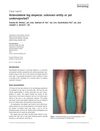7 citations,
March 2020 in “Journal of King Saud University. Science/Maǧallaẗ ǧāmiʹaẗ al-malik Saʹūd. al-ʹUlūm” AiQingHua oil improves blood flow and promotes hair growth in mice.
 5 citations,
April 2024 in “bioRxiv (Cold Spring Harbor Laboratory)”
5 citations,
April 2024 in “bioRxiv (Cold Spring Harbor Laboratory)” Aging skin shows thinner layers, fewer hair follicles, and new biomarkers like increased space between cells and smaller sebaceous glands.
4 citations,
July 2018 in “International Journal of Research in Dermatology” Topical finasteride with minoxidil is effective for treating hair loss and may reduce the need for oral finasteride.
 3 citations,
October 2023 in “Military Medical Research/Military medical research”
3 citations,
October 2023 in “Military Medical Research/Military medical research” Regulatory T cells help heal skin and grow hair, and their absence can lead to healing issues and hair loss.
 1 citations,
April 2023 in “Frontiers in Immunology”
1 citations,
April 2023 in “Frontiers in Immunology” New treatments for hair loss from alopecia areata may include targeting immune cells, using stem cells, balancing gut bacteria, applying fatty acids, and using JAK inhibitors.
 1 citations,
July 2022 in “Functional foods in health and disease/Journal of functional foods in health & disease”
1 citations,
July 2022 in “Functional foods in health and disease/Journal of functional foods in health & disease” Taking a probiotic supplement twice a day improved hair growth, skin hydration, and metabolic health in adults at risk of metabolic syndrome.
1 citations,
October 2018 in “Ukraïnsʹkij žurnal dermatologìï, venerologìï, kosmetologìï” Wolvit® (biotin 5 mg) is effective and safe for treating hair loss and scalp conditions in women.
 1 citations,
May 2017 in “Asian journal of medical sciences”
1 citations,
May 2017 in “Asian journal of medical sciences” The dietary supplement significantly improved skin, nails, and hair in older adults.
 1 citations,
March 2014 in “Senses and Sciences”
1 citations,
March 2014 in “Senses and Sciences” A supplement with Serenoa repens improved hair loss in a patient.
 May 2024 in “Deleted Journal”
May 2024 in “Deleted Journal” Dutasteride effectively treats hair loss in men who don't respond to finasteride.
 February 2024 in “Jurnal Tata Rias”
February 2024 in “Jurnal Tata Rias” Aloe vera and lime shampoo effectively reduces hair loss and improves scalp cleanliness.
 February 2024 in “Benha Journal of Applied Sciences”
February 2024 in “Benha Journal of Applied Sciences” Androgenetic alopecia is common hair loss caused by genetics and hormones.
 November 2023 in “Cell Proliferation”
November 2023 in “Cell Proliferation” A protein from fat-derived stem cells, DKK1, is linked to hair loss and blocking it may help treat alopecia areata.
 October 2023 in “Scientific Reports”
October 2023 in “Scientific Reports” Gene therapy helped rats with a specific type of rickets grow hair without severe inflammation.
 January 2023 in “Springer eBooks”
January 2023 in “Springer eBooks” Hair shedding that lasts over 6 months may need a closer look, but often just reassurance is enough.
August 2021 in “Chinese journal of burns” Combining FUE with rb-bFGF and minoxidil is more effective and has fewer side effects than FUE alone for treating hair loss.
May 2021 in “Indian journal of forensic medicine and toxicology” Low levels of iron and vitamin D might be linked to chronic hair loss in women.

Topical Minoxidil is effective for hair loss after COVID-19.
PRP treatment helps reduce hair loss in post-COVID-19 patients.
September 2020 in “International journal of current pharmaceutical research” Tea tree oil cream effectively reduces hair growth.
 September 2018 in “International Journal of Dermatology”
September 2018 in “International Journal of Dermatology” Anterolateral leg alopecia is a benign, nonprogressive hair loss condition on the lower legs that is not well understood and may resolve on its own.
 August 2018 in “Journal of the American Academy of Dermatology”
August 2018 in “Journal of the American Academy of Dermatology” Tofacitinib is a potential alternative treatment for alopecia totalis, especially in patients with a shorter duration of the condition and more preserved hair follicles, but the overall response rate is low.
January 2018 in “Indian Dermatology Online Journal” A child with Olmsted syndrome showed mild improvement in hair and skin issues with treatment.
 April 2016 in “Journal of Investigative Dermatology”
April 2016 in “Journal of Investigative Dermatology” Phenylephrine may help prevent hair loss from pulling on the hair roots.
 January 2015 in “Springer eBooks”
January 2015 in “Springer eBooks” Hair shedding that lasts more than 6 months may need medical tests, but often just reassurance is enough.
 April 2014 in “The FASEB Journal”
April 2014 in “The FASEB Journal” Platelet-rich plasma therapy can reduce hair loss and enhance hair growth in androgenetic alopecia patients, with no side effects observed.

Botulinum toxin-A may increase hair growth and reduce hair loss in men with baldness, and injecting near blood vessels can improve pain relief and last longer.

Botulinum toxin-A injections in the scalp can reduce hair loss and promote new hair growth in men with certain types of baldness.

Botulinum toxin injections can reduce hair loss and stimulate new hair growth in some men with male pattern baldness.

Botulinum toxin type A reduces itch and inflammation from histamine and may help treat certain skin conditions and hair loss.





















